
English Grammar in Use. Grammar Reference. Raymond Murphy
..pdf
English Grammar in Use
Grammar Reference
Raymond Murphy
Contents
|
Present perfect (I have done) |
2 |
|
|
||
|
|
|
||||
|
|
|
||||
|
Present perfect (I have done) and past simple (I did) |
2 |
||||
|
I will and I’m going to |
3 |
|
|
|
|
|
|
|
|
|||
|
|
|
|
|||
|
Past continuous (I was doing) |
4 |
|
|
||
|
|
|
||||
|
|
|
||||
|
Past continuous (I was doing) and past simple (I did) |
4 |
||||
|
Past perfect (I had done) 5 |
|
|
|
||
|
|
|
|
|||
|
|
|
|
|||
|
Reported speech (He said that …) |
6 |
|
|||
|
|
|||||
|
|
|||||
|
If I do, If I did and If I had done 7 |
|
|
|||
|
|
|
||||
|
|
|
||||
|
Must and can’t |
8 |
|
|
|
|
|
|
|
|
|
||
|
|
|
|
|
||
|
May and might |
8 |
|
|
|
|
|
Passive (is done / was done) |
9 |
|
|
||
|
|
|
||||
|
|
|
||||
|
Passive verbs with two objects |
9 |
|
|
||
|
Verb + -ing / to |
10 |
|
|
|
|
|
|
|
|
|
||
|
|
|
|
|
||
|
Preposition (in/for/about etc.) + -ing |
10 |
|
|||
|
Spelling rules |
11 |
|
|
|
|
|
|
|
|
|
||
|
|
|
|
|
||
|
List of irregular verbs |
12 |
|
|
|
|
|
|
|
|
|||
|
|
|
|
|||
For further practice:
English Grammar in Use Supplementary Exercises
Louise Hashemi with Raymond Murphy
Cambridge University Press © 2004
Not for sale separately
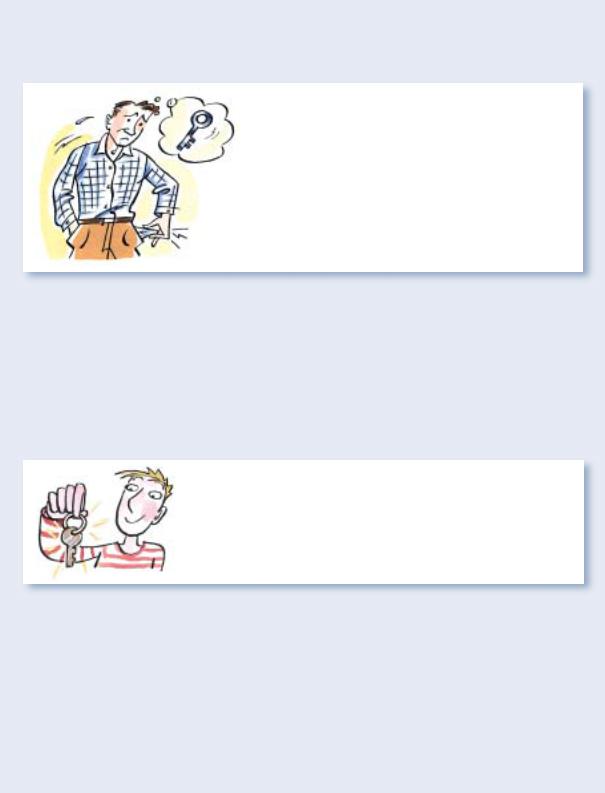
Present perfect (I have done)
Tom is looking for his key. He can’t find it.
He has lost his key.
He has lost his key = He lost it recently, and he still doesn’t have it.
Have/has lost is the present perfect simple:
I/we/they/you |
have |
(= I’ve etc.) |
finished |
|
lost |
||||
|
|
|
||
he/she/it |
has |
(= he’s etc.) |
done |
|
been etc. |
||||
|
|
|
|
The present perfect simple is have/has + past participle. The past participle often ends in -ed (finished/decided etc.), but many important verbs are irregular (lost/done/written etc.).
For a list of irregular verbs, see page 12.
Present perfect (I have done) and past simple (I did)
Now Tom has found his key. He has it now.
Has he lost his key?
Did he lose his key?
No, he has found it.
Yes, he did.
He lost his key (past simple)
but now he has found it. (present perfect)
The present perfect (something has happened) is a present tense. It always tells us about the situation now. ‘Tom has lost his key’ = he doesn’t have his key now (see Unit 7).
The past simple (something happened) tells us only about the past. If somebody says ‘Tom lost his key’, this doesn’t tell us whether he has the key now or not. It tells us only that he lost his key at some time in the past.
Do not use the present perfect if the situation now is different. Compare:

 They’ve gone away. They’ll be back on Friday. (they are away now)
They’ve gone away. They’ll be back on Friday. (they are away now)
They went away, but I think they’re back at home now. (not They’ve gone)
2
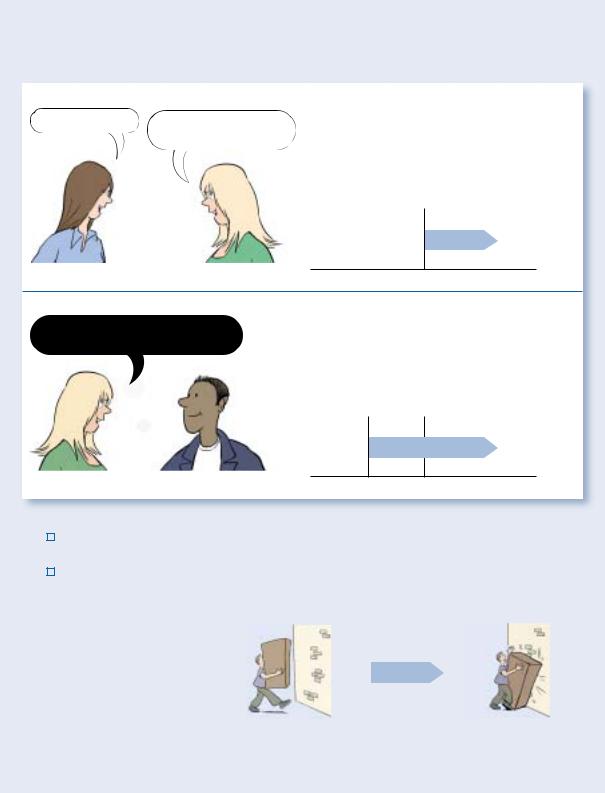
I will and I’m going to
Sue is talking to Helen:
Let’s have a party. |
That’s a great idea. |
|
We’ll invite lots of people. |
will (’ll): We use will when we decide to do something at the time of speaking. The speaker has not decided before. The party is a new idea.
decision now
I’ll …
SUE |
HELEN |
past |
now |
future |
Later that day, Helen meets Dave:
Sue and I have decided to have a party. We’re going to invite lots of people.
(be) going to: We use (be) going to when we have already decided to do something. Helen had already decided to invite lots of people before she spoke to Dave.
decision before
I’m going to …
HELEN |
DAVE |
past |
now |
future |
Compare: |
|
|
||
|
|
‘Gary phoned while you were out.’ |
‘OK. I’ll call him back.’ |
|
|
|
|||
|
|
|||
|
|
‘Gary phoned while you were out.’ |
‘Yes, I know. I’m going to call him back.’ |
|
|
|
‘Ann is in hospital.’ |
‘Oh really? I didn’t know. I’ll go and visit her.’ |
|
|
|
|||
|
|
|||
|
|
‘Ann is in hospital.’ |
‘Yes, I know. I’m going to visit her this evening.’ |
|
When we say that ‘something is going to happen’, the situation now makes this clear.
The man is walking towards the
wall now, so we can see that he going to is going to walk into it.
situation now |
future happening |
3
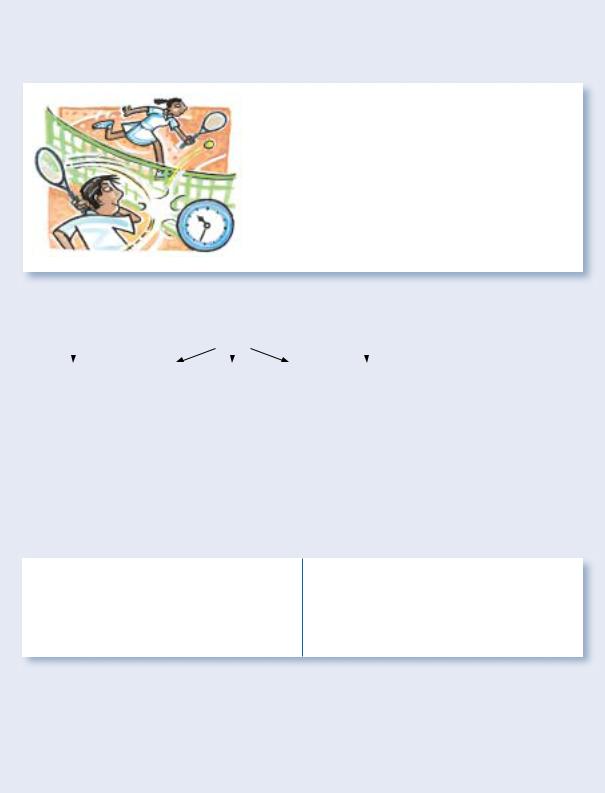
Past continuous (I was doing)
Yesterday Karen and Jim played tennis. They began at 10 o’clock and finished at 11.30.
So, at 10.30 they were playing tennis.
They were playing = they were in the middle of playing. They had not finished playing.
Was/were -ing is the past continuous:
I/he/she/it |
was |
playing |
|
doing |
|||
we/you/they |
were |
||
working etc. |
|||
|
|
||
|
|
|
I was doing something = I was in the middle of doing something at a certain time. The action or situation had already started before this time, but had not finished:
I started doing |
I was doing |
I finished doing |
|
|
|||
|
|
|
|
|
|
|
|
|
|
|
|
|
|
|
|
past |
|
|
past |
now |
|||

 This time last year I was living in Brazil.
This time last year I was living in Brazil.

 What were you doing at 10 o’clock last night?
What were you doing at 10 o’clock last night?

 I waved to Helen, but she wasn’t looking.
I waved to Helen, but she wasn’t looking.
Past continuous (I was doing) and past simple (I did)
Past continuous (in the middle of an action)

 I was walking home when I met Dave. (in the middle of an action)
I was walking home when I met Dave. (in the middle of an action)

 Kate was watching television when we arrived.
Kate was watching television when we arrived.
Past simple (complete action)

 I walked home after the party last night. (= all the way, completely)
I walked home after the party last night. (= all the way, completely)

 Kate watched television a lot when she was ill last year.
Kate watched television a lot when she was ill last year.
4
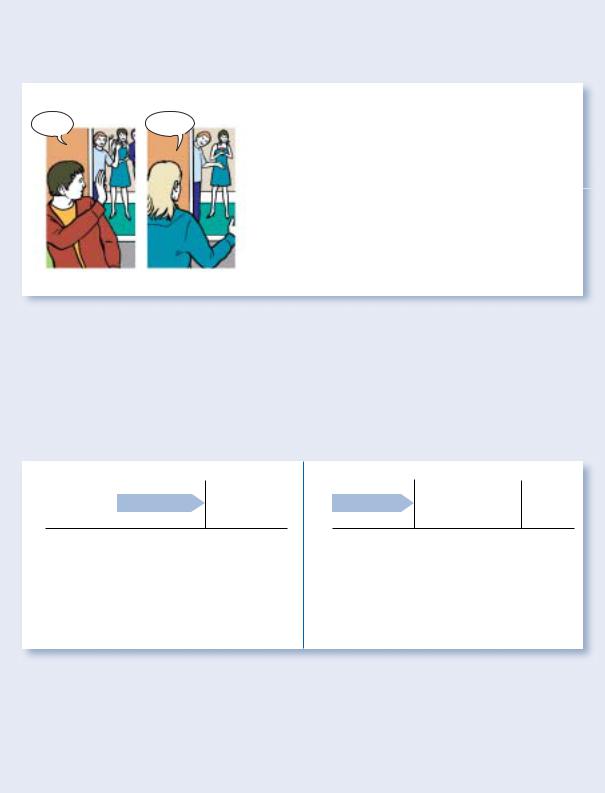
Past perfect (I had done)
at 10.30 |
at 11.00 |
Bye! |
Hello! |
PAUL SARAH
Sarah went to a party last week. Paul went to the party too, but they didn’t see each other. Paul left the party at 10.30 and Sarah arrived at 11 o’clock. So:
When Sarah arrived at the party, Paul wasn’t there.
He had gone home.
Had gone is the past perfect (simple):
I/we/they/you |
|
(= I’d etc.) |
gone |
|
had |
seen |
|||
he/she/it |
(= he’d etc.) |
|||
|
finished etc. |
|||
|
|
|
||
|
|
|
|
The past perfect simple is had + past participle (gone/seen/finished etc). For a list of irregular verbs, see page 12.
Sometimes we talk about something that happened in the past:

 Sarah arrived at the party.
Sarah arrived at the party.
This is the starting point of the story. Then, if we want to talk about things that happened before this time, we use the past perfect (had …):

 When Sarah arrived at the party, Paul had already gone home.
When Sarah arrived at the party, Paul had already gone home.
Compare the present perfect (have seen etc.) and the past perfect (had seen etc.):
Present perfect
have seen
past |
now |

 Who is that woman? I’ve never seen her before.
Who is that woman? I’ve never seen her before.
 We aren’t hungry. We’ve just had lunch.
We aren’t hungry. We’ve just had lunch. 
 The house is dirty. They haven’t cleaned it for weeks.
The house is dirty. They haven’t cleaned it for weeks.
Past perfect
had seen
past |
now |

 I didn’t know who she was. I’d never seen her before. (= before that time)
I didn’t know who she was. I’d never seen her before. (= before that time)
 We weren’t hungry. We’d just had lunch.
We weren’t hungry. We’d just had lunch. 
 The house was dirty. They hadn’t cleaned it for weeks.
The house was dirty. They hadn’t cleaned it for weeks.
5
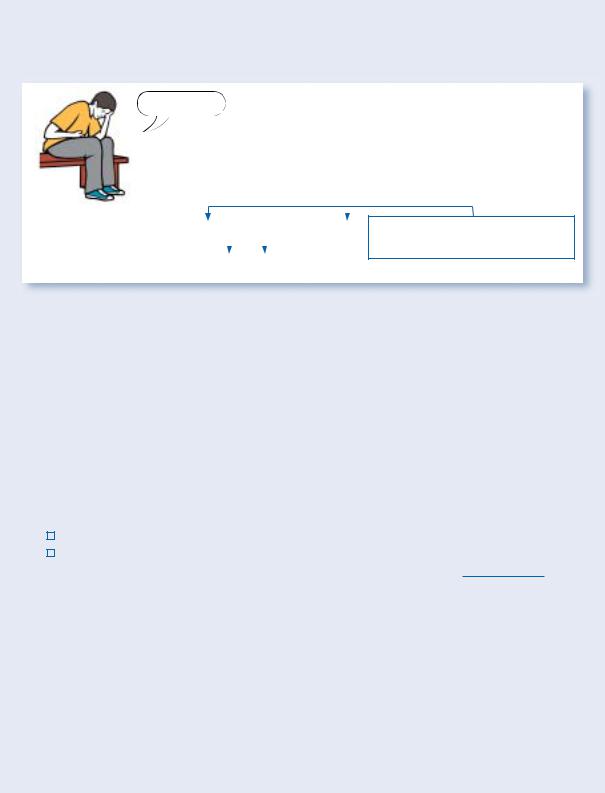
Reported speech (He said that …)
I’m feeling ill.
PAUL
You want to tell somebody what Paul said. There are two ways of doing this:
You can repeat Paul’s words (direct speech): Paul said, ‘I’m feeling ill.’
Or you can use reported speech:
Paul said that he was feeling ill.
Compare: |
|
|
|
|
|
|
|
|
|
|
|
Paul said, ‘ |
|
|
|
|
|
|
feeling ill.’ |
In writing we use these quotation |
|||
direct |
I |
|
|
am |
|||||||
|
|
|
|
|
|
|
|
|
|
|
marks to show direct speech. |
|
|
|
|
|
|
|
|
|
|
|
|
reported |
Paul said that |
|
he |
|
|
was |
feeling ill. |
|
|||
|
|
|
|
|
|
|
|
|
|
|
|
When we use reported speech, the main verb of the sentence is usually past (Paul said that … / I told her that … etc.). The rest of the sentence is usually past too:

 Paul said that he was feeling ill.
Paul said that he was feeling ill.

 I told Lisa that I didn’t have any money.
I told Lisa that I didn’t have any money.
In general, the present form in direct speech changes to the past form in reported speech:
am/is was |
do/does did |
will would |
||||
are were |
have/has had |
can could |
||||
want/like/know/go etc. wanted/liked/knew/went etc. |
|
|
|
|||
Say and tell |
|
|
|
|
||
If you say who you are talking to, use tell: |
TELL SOMEBODY |
|||||
|
|
Sonia told me that you were in hospital. (not Sonia said me) |
|
|||
|
|
|||||
|
|
|||||
|
|
What did you tell the police? (not say the police) |
|
|
|
|
|
|
|
|
|
||
|
|
|
|
|
||
Otherwise use say: |
|
SAY |
SOMEBODY |
|||

 Sonia said that you were in hospital. (not Sonia told that …)
Sonia said that you were in hospital. (not Sonia told that …)

 What did you say?
What did you say?
But you can ‘say something to somebody’:

 Ann said goodbye to me and left. (not Ann said me goodbye)
Ann said goodbye to me and left. (not Ann said me goodbye)

 What did you say to the police?
What did you say to the police?
6

If I do … and If I did …
(1)Lisa has lost her watch. She tells Sue:
LISA: I’ve lost my watch. Have you seen it anywhere? SUE: No, but if I find it, I’ll tell you.
In this example, Sue feels there is a real possibility that she will find the watch. So she says: if I find … , I’ll … .
(2) Joe says:
If I found a wallet in the street, I’d take it to the police station.
This is a different type of situation. Here, Joe doesn’t expect to find a wallet in the street; he is imagining a situation that will probably not happen. So he says:
if I found … , I’d (= I would) … . (not if I find … , I’ll …)
When you imagine something like this, you use if + past
(if I found / if there was / if we didn’t etc.). But the meaning is not past:

 What would you do if you won a million pounds? (we don’t really expect this to happen)
What would you do if you won a million pounds? (we don’t really expect this to happen)
If I had known …
Last month Gary was in hospital for a few days. Rachel didn’t know this, so she didn’t go to visit him. They met a few days ago. Rachel said:
If I had known you were in hospital, I would have gone to see you.
Rachel said: If I had known you were in hospital … . This tells us that she didn’t know he was in hospital.
We use if + had (’d) … to talk about the past (if I had known/been/done etc.):

 I didn’t see you when you passed me in the street. If I’d seen you, of course I would have said hello. (but I didn’t see you)
I didn’t see you when you passed me in the street. If I’d seen you, of course I would have said hello. (but I didn’t see you)

 The view was wonderful. If I’d had a camera with me, I would have taken some photographs. (but I didn’t have a camera)
The view was wonderful. If I’d had a camera with me, I would have taken some photographs. (but I didn’t have a camera)
7

Must and can’t
|
|
must |
be (tired / hungry / at work etc.) |
Present |
I/you/he (etc.) |
be (doing / going / joking etc.) |
|
|
|
can’t |
do / get / know / have etc. |
|
|
|
|
|
|
|
|
You can use must to say that you believe something is certain:

 You’ve been travelling all day. You must be tired. (Travelling is tiring and you’ve been travelling all day, so you must be tired.)
You’ve been travelling all day. You must be tired. (Travelling is tiring and you’ve been travelling all day, so you must be tired.)
You can use can’t to say that you believe something is not possible:

 You’ve just had lunch. You can’t be hungry already. (People are not normally hungry just after eating a meal. You’ve just eaten, so you can’t be hungry.)
You’ve just had lunch. You can’t be hungry already. (People are not normally hungry just after eating a meal. You’ve just eaten, so you can’t be hungry.)
|
|
must |
been (asleep / at work |
etc.) |
|
Past |
I/you/he (etc.) |
have been (doing / looking |
etc.) |
||
can’t |
|||||
|
|
gone / got / known etc. |
|||
|
|
|
|||
|
|
|
|
|
|

 I didn’t hear the phone. I must have been asleep.
I didn’t hear the phone. I must have been asleep.

 Tom walked into a wall. He can’t have been looking where he was going.
Tom walked into a wall. He can’t have been looking where he was going.
May and might
|
|
may |
|
be (true / in his office etc.) |
|
Present |
I/you/he (etc.) |
(not) |
be (doing / working / having etc.) |
||
might |
|||||
|
|||||
|
|
|
|
know / work / want etc. |
We use may or might to say that something is a possibility. Usually you can use may or might,
so you can say: |
|
|
|
|||
|
|
It may be true. or It might be true. (= perhaps it is true) |
||||
|
|
|||||
|
|
|||||
|
|
She might know. |
or She may know. |
|||
|
|
|||||
|
|
|||||
|
|
|
|
|
|
|
Past |
|
|
may |
|
been (asleep / at home etc.) |
|
|
I/you/he (etc.) |
(not) have |
been (doing / working / feeling etc.) |
|||
|
might |
|||||
|
|
|
||||
|
|
|
|
|
|
known / had / wanted / left etc. |
|
|
|
|
|
|
|
|
|
A: I wonder why Kate didn’t answer the phone. |
||||
|
|
|||||
|
|
|||||
|
|
B: She may have been asleep. (= perhaps she was asleep) |
||||
|
|
A: I was surprised that Kate wasn’t at the meeting yesterday. |
||||
|
|
|||||
|
|
|||||
|
|
B: She might not have known about it. (= perhaps she didn’t know) |
||||
8

Passive (is done / was done)
The passive is be (is/was etc.) + past participle (done/cleaned/seen etc.): (be) done (be) cleaned (be) damaged (be) built (be) seen etc.
For irregular past participles (done/seen/known etc.), see page 12.
Present simple |
|
|
|
|
|
|
|
active: |
clean(s) / see(s) etc. |
Somebody cleans |
this room |
every day. |
|||
|
|
|
|
|
|
|
|
|
am/is/are + cleaned/seen etc. |
|
|
is cleaned every day. |
|||
passive: |
This room |
||||||
|
|
|
|
|
|
|
|

 Many accidents are caused by careless driving.
Many accidents are caused by careless driving.

 I’m not often invited to parties.
I’m not often invited to parties.

 How is this word pronounced?
How is this word pronounced?
Past simple |
|
|
|
|
|
|
|
active: |
cleaned/saw etc. |
Somebody cleaned |
this room |
yesterday. |
|||
|
|
|
|
|
|
|
|
passive: |
was/were + cleaned/seen etc. |
|
|
was cleaned yesterday. |
|||
This room |
|||||||
|
|
|
|
|
|
|
|

 We were woken up by a loud noise during the night.
We were woken up by a loud noise during the night.

 ‘Did you go to the party?’ ‘No, I wasn’t invited.’
‘Did you go to the party?’ ‘No, I wasn’t invited.’

 How much money was stolen in the robbery?
How much money was stolen in the robbery?
Passive verbs with two objects
Some verbs can have two objects. For example, give:

 Somebody gave the police the information. (= Somebody gave the information to the police)
Somebody gave the police the information. (= Somebody gave the information to the police)
object 1 |
object 2 |
So it is possible to make two passive sentences:

 The police were given the information. or
The police were given the information. or
The information was given to the police.
Other verbs which can have two objects are:
ask offer pay show teach tell
When we use these verbs in the passive, most often we begin with the person:

 I was offered the job, but I refused it. (= they offered me the job)
I was offered the job, but I refused it. (= they offered me the job)

 You will be given plenty of time to decide. (= we will give you plenty of time)
You will be given plenty of time to decide. (= we will give you plenty of time)

 Have you been shown the new machine? (= has anybody shown you?)
Have you been shown the new machine? (= has anybody shown you?)

 The men were paid £400 to do the work. (= somebody paid the men £400)
The men were paid £400 to do the work. (= somebody paid the men £400)
9

Verb + -ing
Here are some verbs that are followed by -ing:
stop |
postpone |
admit |
avoid |
imagine |
enjoy |
suggest |
finish |
consider |
deny |
risk |
fancy |
mind |
|
|
|
|
|
|
|
|

 Suddenly everybody stopped talking. There was silence.
Suddenly everybody stopped talking. There was silence.

 I’ll do the shopping when I’ve finished cleaning the flat.
I’ll do the shopping when I’ve finished cleaning the flat.
Verb + to …
If these verbs are followed by another verb, the structure is usually verb + to … (infinitive)
offer |
decide |
hope |
deserve |
promise |
agree |
plan |
manage |
afford |
threaten |
refuse |
arrange |
fail |
forget |
learn |
|
|
|
|
|

 It was late, so we decided to take a taxi home.
It was late, so we decided to take a taxi home.

 Simon was in a difficult situation, so I agreed to help him.
Simon was in a difficult situation, so I agreed to help him.
Preposition (in/for/about etc.) + -ing
If a preposition (in/for/about etc.) is followed by a verb, the verb ends in -ing:
|
preposition |
verb (-ing) |
|
Are you interested |
in |
working |
for us? |
I’m not very good |
at |
learning |
languages. |
Sue must be fed up |
with |
studying. |
|
What are the advantages |
of |
having |
a car? |
Thanks very much |
for |
inviting |
me to your party. |
How |
about |
meeting |
for lunch tomorrow? |
Why don’t you go out |
instead of |
sitting |
at home all the time? |
Carol went to work |
in spite of |
feeling |
ill. |
|
|
|
|
10
